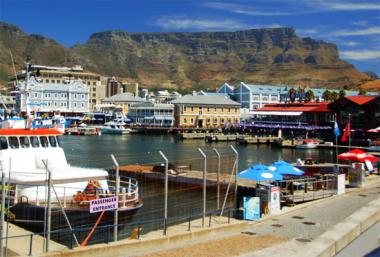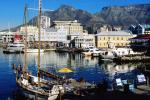V&A Waterfront in choppy seas amid worries Growthpoint overpaid
 Cape Town’s working harbor, the V&A Waterfront with Table Mountain in the background.
Cape Town’s working harbor, the V&A Waterfront with Table Mountain in the background.
The JSE's largest property company Growthpoint is battling to digest the V&A Waterfront, which it swallowed in June as part of South Africa's biggest-ever property deal.
Growthpoint and the Public Investment Corporation (PIC) bought 50% each of the V&A Waterfront from a consortium led by the cash-hungry Dubai World for R9.9-billion.
However, the new owners paid nearly 40% more than the R7-billion that Dubai World's consortium paid for it in 2006, raising questions about whether Growthpoint got shareholders to overpay.
At this week's Growthpoint AGM, CEO Norman Sasse confirmed that shareholders will now see slower growth in their annual dividend, as the company must repay the R4.9-billion it had to raise to cover its half.
Sasse also admitted that "when you speak to guys on the ground [about getting tenants to renew their leases], it's still pretty tough out there".
Last year, about 3.5% of the V&A Waterfront's 191918m² rental space remained empty - and Growthpoint is hoping that figure does not rise.
One high-end section of the Waterfront, the Link Mall, is of particular worry as most of those leases expire next March and must be renewed soon.
In an interview after the AGM, Sasse said: "Those [Link Mall] leases were signed in 2007 at the peak of the market and we always were concerned by those leases, and what would happen when we had to renew them."
Many of those leases - by jewellery stores and fashion boutiques - were signed at around R500/m². This is far above the average cost for retail space of around R150-R350/m² in other malls.
"We were nervous as we hadn't seen too many leases at around R500/m², and we discounted these rates in our calculations. But we've already renegotiated some of these leases at better [rates] than we thought," said Sasse.
Sasse said about half of the Link Mall tenants have signed new leases, but for less than the previous average of R500/m², ahead of the March deadline.
Zayd Sulaiman, portfolio manager for Catalyst Fund Managers, said the jury is still out on whether Growthpoint overpaid.
"Time will tell. A full price was paid, but you weren't going to buy the Waterfront at a discount. There's a lot of [unused] land to develop, and the environment is not conducive to development right now."
Fuelling this debate is that Growthpoint did not publish an opinion from an independent adviser on whether the deal was "fair and reasonable" for all shareholders - nor did it put the deal to shareholders to vote on whether it should proceed.
A company is obliged to get such a "fairness" opinion and organise a shareholder vote if a deal is particularly large, or if there is a "related party" involved in the deal.
Some analysts say Growthpoint ought to have obtained an independent opinion, considering there are "related parties" in the PIC, which is the property company's 27% shareholder.
Said Sasse: "This would only have been a related party if Growthpoint had bought the V&A Waterfront from one of its shareholders.
"In this case, the PIC is our shareholder but we didn't buy it from them, we bought it from a third party we weren't related to."
Growthpoint did provide an internal valuation of its deal, however, which showed it was paying slightly above the normal market rates.
According to a presentation to shareholders in February, the V&A Waterfront made nearly R500-million last year in profit on the developed area.
So by paying R8.1-billion for the Waterfront, plus R1.6-billion for the undeveloped assets, Growthpoint and the PIC paid nearly 17 times its earnings.
This is steep, considering most JSE stocks are being bought for around 12 times their earnings.
Sasse argues that profits from the Waterfront doubled in four years from 2006 - so a relatively high price can be justified, especially given the "scarcity value" of the prime property.
"This was one of the most valuable property assets in the country and continent, and the opportunity to buy such an asset only comes once every 50 years. So, it's never going to go cheap [but] we felt it presented fair value," he said.
Stuart Sinclair, an analyst for Efficient Select, said: "It's a tough deal for shareholders not to be approached to sanction the transaction, but in the end you have to believe management has investors' interests at heart."
A CEO of a rival property company said Growthpoint took a big gamble on the Waterfront.
"It's dilutionary for shareholders, so the market didn't like it. We wouldn't have paid more than R6-billion for it so, for Growthpoint to repay the debt on the deal, you need to get a high turnover of feet in those stores, and that isn't happening now," he said.
The debt that Growthpoint took on to do the deal also led to ratings agency Moody's downgrading its rating in June.
Moody's warned in a research note that while Growthpoint still has "ample headroom" over its rising debt levels, the downgrade "reflects Moody's view that [the company's] financial metrics have weakened" due to the Waterfront deal.
But Sasse pointed out that Growthpoint has already repaid R1.8-billion to its funders by issuing new shares.
"Our debts still amount to less than 40% of our R45-billion in assets, so we're very comfortable on this front," he said.
In all, Growthpoint now has R14.2-billion of debt in South Africa - more than its peers in the listed property sector.
Sasse said this is manageable. "We pay R2.2-billion to shareholders every year, so for us to face any cash crunch where we couldn't do this, 50% of our tenants would have to refuse to renew their leases. Nothing's impossible, but we're comfortable that won't happen."

















